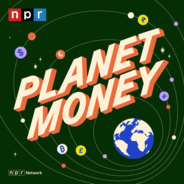(For our story on this year's Nobel in Economics, check out our daily show, The Indicator!)Let's face it. Economics is filled with terms that don't always make sense to the average person. Terms that sometimes mean what you think they mean, but sometimes not at all. Not even close.We surveyed 188 economists. And we asked them: What are the most misunderstood terms in the field of economics?On today's show, their answers! Hear stories about near recessions, a problem with insurance, econ at your local movie theater, and... an economics term that will make undergrads blush. Strap in, and bring your popcorn!This episode was hosted by Amanda Aronczyk and Alexi Horowitz-Ghazi. It was produced by Sam Yellowhorse Kesler with help from Sean Saldana. It was edited by Jess Jiang, engineered by Valentina Rodríguez Sánchez and fact-checked by Sierra Juarez. Alex Goldmark is our executive producer.Help support Planet Money and hear our bonus episodes by subscribing to Planet Money+ in Apple Podcasts or at plus.npr.org/planetmoney.Learn more about sponsor message choices: podcastchoices.com/adchoicesNPR Privacy Policy

Wirtschaft
Planet Money Folgen
Wanna see a trick? Give us any topic and we can tie it back to the economy. At Planet Money, we explore the forces that shape our lives and bring you along for the ride. Don't just understand the economy – understand the world.Wanna go deeper? Subscribe to Planet Money+ and get sponsor-free episodes of Planet Money, The Indicator, and Planet Money Summer School. Plus access to bonus content. It's a new way to support the show you love. Learn more at plus.npr.org/planetmoney
Folgen von Planet Money
355 Folgen
-
Folge vom 16.10.2024We asked 188 economists. And the survey says...
-
Folge vom 11.10.2024So imPORTant: Bananas, frogs, and... Bob's??Even in our modern world with planes and jets and drones, the vast majority of goods are moved around the planet in cargo ships. Which means our ports are the backbone of our global economy. The longshoremans' strike closed the eastern ports for only three days, but those three days raised a lot of questions.Like - why is a discount furniture store the fourth largest importer on the East Coast? How come so many bananas come through Wilmington, Delaware? Why do we need live frogs delivered into the US six times a month? And... how do we even keep track of all of these imports? On today's episode, we get into #PortFacts!This episode was hosted by Kenny Malone and Amanda Aronczyk. It was produced by Sam Yellowhorse Kesler. It was edited by Audrey Quinn, and fact-checked by Dania Suleman. Engineering by Cena Loffredo and Kwesi Lee with an assist from Valentina Rodriguez Sanchez. Alex Goldmark is Planet Money's executive producer.Help support Planet Money and hear our bonus episodes by subscribing to Planet Money+ in Apple Podcasts or at plus.npr.org/planetmoney.Learn more about sponsor message choices: podcastchoices.com/adchoicesNPR Privacy Policy
-
Folge vom 09.10.2024Can cap and trade work in the US?Recently, the state of Washington embarked on an ambitious new plan to combat climate change. Taking a page from economics textbooks, the state instituted a statewide "cap and trade" system for carbon emissions. The state establishes a cap on the total amount of carbon pollution it is willing to allow each year, and then gives away or auctions off carbon emission permits that add up to that total. Companies can then trade those permits on the open market.Economists love cap and trade plans because they establish a limit on carbon emissions while letting the market find the most efficient way for decarbonization to occur. But cap and trade has had a hard time catching on, especially in the U.S.The stakes are high for Washington's new plan. If it succeeds, it could convince other states to implement their own versions, but if it fails, it might serve as a cautionary tale. On today's show, we take a look at how Washington's grand experiment with cap and trade is faring.This episode was hosted by Keith Romer and Kenny Malone. It was produced by Emma Peaslee and edited by Emily Siner. It was fact checked by Sierra Juarez and engineered by Valentina Rodriguez Sanchez. Alex Goldmark is Planet Money's executive producer.Help support Planet Money and hear our bonus episodes by subscribing to Planet Money+ in Apple Podcasts or at plus.npr.org/planetmoney.Learn more about sponsor message choices: podcastchoices.com/adchoicesNPR Privacy Policy
-
Folge vom 04.10.2024What's up with all the ads for law firms?The lawyer commercial is almost an art form unto itself. Learned practitioners of the law doing whatever it takes to get your attention, from impressive dirt bike stunts to running around half naked. All so when you land in trouble, you don't have to think hard to remember their name. Odds are you can name one or two right now.This world of law ads did not exist fifty years ago. Then, lawyers were not allowed to advertise. Not by law, by the exclusive organization that decides who gets to be a lawyer: state bars.On today's episode, how that changed. How a couple of lawyers placing an ad in a local newspaper led to the inescapable world of law firm ads we know today. And, how the right to advertise got put on the same level as some of the most important, fundamental rights we have.This episode was hosted by Nick Fountain and Jeff Guo. It was produced by Sam Yellowhorse Kesler with help from Sean Saldana. It was edited by Jess Jiang. It was fact-checked by Sierra Juarez and engineered by Valentina Rodríguez Sánchez. Alex Goldmark is Planet Money's executive producer.Help support Planet Money and hear our bonus episodes by subscribing to Planet Money+ in Apple Podcasts or at plus.npr.org/planetmoney.Learn more about sponsor message choices: podcastchoices.com/adchoicesNPR Privacy Policy
